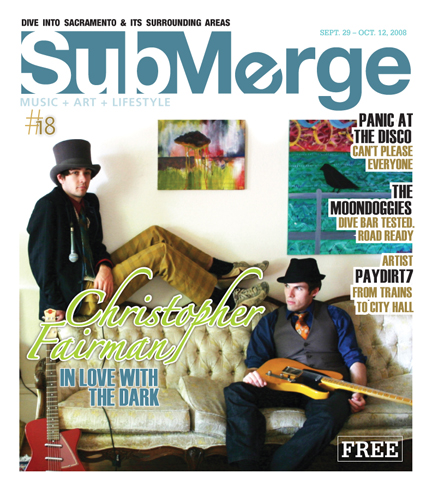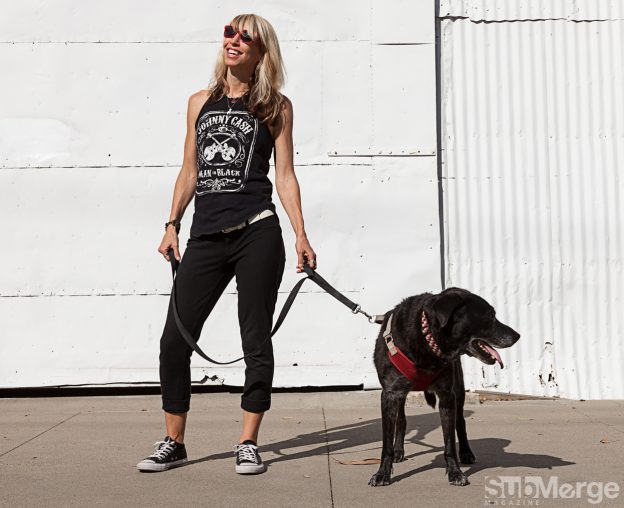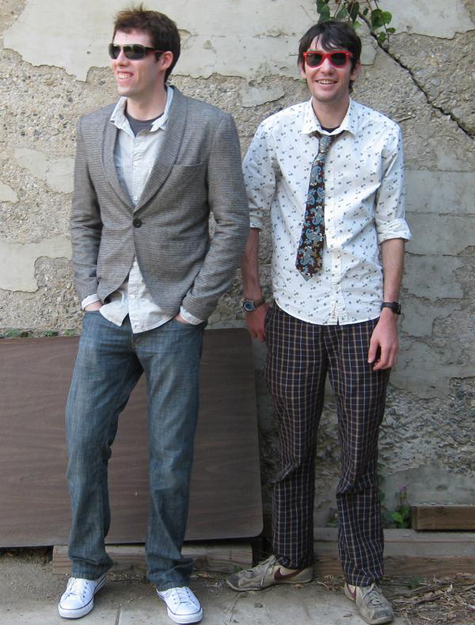This month, Allyson Seconds will release her second solo album, a collaboration with homegrown songwriter and producer Anton Barbeau, whom she met as a teenager working at the Java City on 18th and Capitol.
Barbeau is one of many local musicians with whom Seconds forged a musical bond during her time at the popular coffee shop/venue in the mid-‘90s. In addition to Barbeau, she met her husband, Kevin Seconds of the band 7 Seconds, and local booking legend Jerry Perry, who was recently tapped to book the live music for several massive Bernie Sanders rallies in Northern California this summer, including one at UC Davis where Allyson and her husband played in front of nearly 10,000 people.
She’s an environmentalist and an animal lover who draws zero distinction between her personal life, her music and her politics. She made that clear during a recent phone call with Submerge, when the conversation dipped briefly into the election on the heels of the first debate. She is who she is, whether she’s singing, hiking trails, taking photos or running her fitness company.
Her upcoming album, titled Little World, will come out on Oct. 21, 2016. She’ll play a release show at Shine the following day, with Barbeau and Kevin Seconds joining her on the bill.
Seconds recorded the album while fighting off an illness she caught after flying home from a tour and descending into the smoke of last summer’s wildfire-ravaged hellscape.
“It looked apocalyptic outside and it felt apocalyptic in my throat,” she said of the recording sessions in Barbeau’s father’s living room.
“We embraced the edge of rawness in [Allyson’s] voice,” said Barbeau, noting that a casual listener likely wouldn’t notice a difference, but that an extra layer of authenticity could be found.
We talked about everything from the importance of those early musical years in Sacramento to the recording of Little World which is layered with rich harmonies and anchored by catchy melodies. This is a playfully experimental collection of pop songs that will simultaneously stick in your head and keep you guessing from one verse to the next.
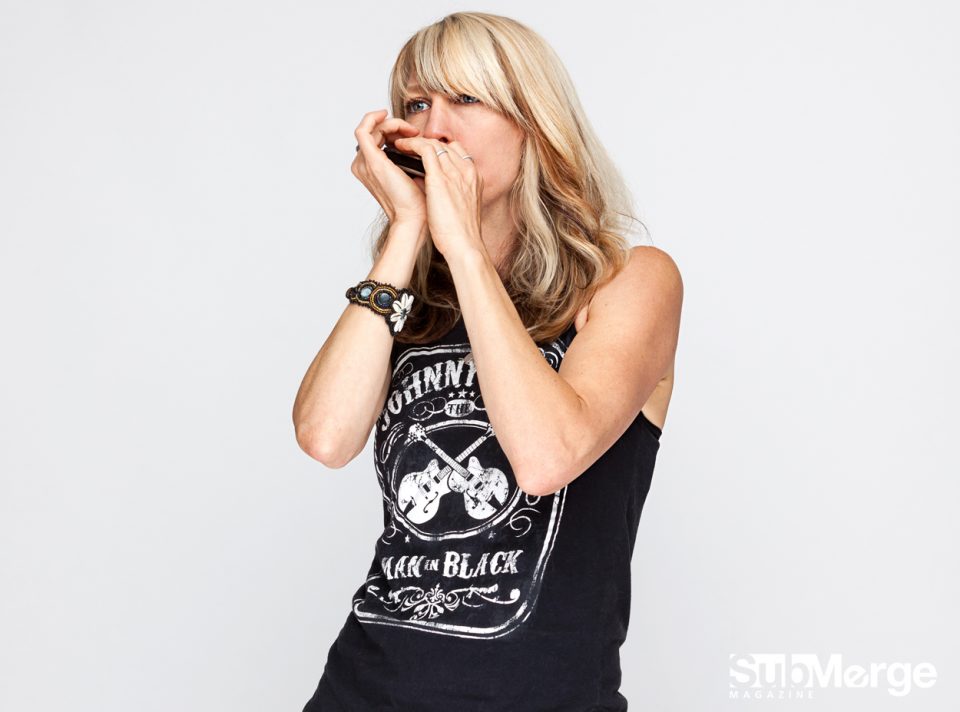
How did you and Anton begin collaborating?
I met Anton around town in the early ‘90s. I worked at Java City on 18th and Capitol when that was the only thing going on around town. There was nothing else going on except for, like, Cattle Club. There were staple folks, and Anton was definitely one of them. That’s actually where I met my husband and we started singing together. Anton’s songs always spoke to me. They just have a melodic aesthetic.
What was the recording process like?
Anton and I have a first CD that we did together in 2009 called Bag of Kittens. That came about because I was going to ask all of my favorite singer-songwriters in Sacramento to just write me a song because I had sung harmony with basically everybody. Everyone was like, “When are you going to do your own solo thing?” and I was like, “I don’t know. I suppose I should do that before I’m like 80 years old.”
It’s scary to sing alone if you’re a harmony singer, but I like to push myself. I asked Anton to write me one song and he basically wrote me like 13. So that’s how the first album came about. He comes home [to Sacramento from Europe] every year to be with his dad. We’ve recorded both albums in his dad’s living room. The second album came about from us hanging out and going, “Hey, wanna do that again?” It was so nonchalant and kind of wonderful that way.
What’s the living room studio space like?
It’s a dusty Sacramento living room and it’s got Anton’s scrappy drum kit and laptop and Wurlitzer and microphones. We just make it work. We’ve recorded so much stuff there. On this album and the last album, the trumpet was recorded by Vince DiFiore from Cake in that living room. It’s not any sort of spiffy set-up at all. It’s so Sacramento.
What’s it like harmonizing with yourself, as you often do on Little World?
I have a weird voice dysmorphia and I have no idea what I sound like, or if it sounds good at all. I’m one of those people. Anton loves when I harmonize with myself in recordings and I’m like, “Really? Are you sure that sounds good?” He’s like, “I love it! We’re doing it!” I’m like, “I’m going to trust you!”
What’s your approach to writing a harmony?
I liken it to playing piano by ear. You kind of just play along until you find the right thing and you know it’s good or you know it isn’t. You go for the things that feel good. That’s how I do harmony with almost everybody I play with. Sometimes I sing with my husband and he’ll have kind of an idea in mind. I’ll try to do that and I‘ll morph it into something else and he’ll be like, “Aww yeah, that’s better!” It just depends. It’s mostly just finding what works.
I read that you felt sick during a chunk of these recording sessions. How challenging was that?
I was on an airplane coming back from being on tour with Kevin. I came back to the wildfires last year that were just horrendous. The air was visible. Those two things took a toll. We had a timeline for recording because Anton was leaving to go back to Europe, so we wanted to get it done. The album cover is a picture I took at that time, and it’s just hazy and looks so apocalyptic.
When it came time to sing, were you able to settle in and find comfort?
No, it was hard. There were a couple of songs where we were pushing my voice a little higher and some lower. Anton has an affinity for my lower voice.
You are vocal about treatment of animals and the environment. How does that manifest itself in you as a person and as an artist?
Nothing is separate at all. It makes sense that when Anton was writing these songs [the environment and nature] would be a part of it. He does a great job of thinking of me and who I am and what’s going on in my life. He did it for the first album as well. It’s all encompassing—an extension of me completely.
How many dogs do you have?
Two dogs. Lulu made both album covers and was the cover model for the last 7 Seconds album, so we’re kind of obsessed with our animals!
How does the other dog feel about that?
What’s great about Hank (pictured above) is he cares less about the limelight. He doesn’t care. Lulu just sounds like someone who would care more about the camera and will always pose for the camera. She’s a photographer’s daughter for sure.
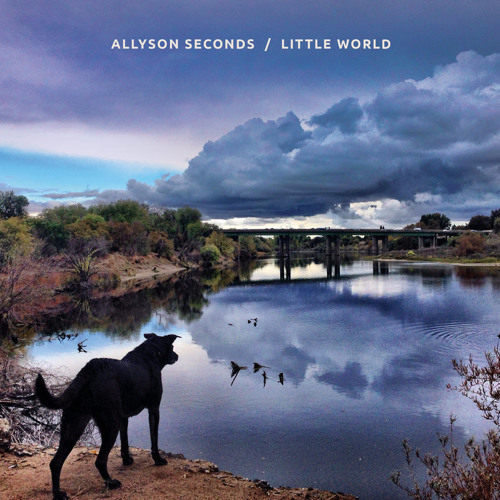
What’s the story behind the album cover?
Anton picked that photo out. I had no idea what the cover would be, but he did a mock-up and surprised me and I went, ‘Whoa, that’s perfect!’ It really encompasses it. As apocalyptic as it looks, there’s still a bit of blue sky poking through.
Where was the photo taken?
It’s my favorite spot on the American River, behind REI and Costco. I don’t go there anymore because it got too dangerous with different run-ins. I’ve just sadly had to start going somewhere else, but I’m not giving up. I’m going to head back there because I love it so much.
There has been less and less support for the homeless and a lot of programs got cut. I went there all the time because my dogs are barkers. I went there for years, daily. We’re talking 300 out of 365 days a year I’m at the river. I love it. I’m friends with several of the folks who live out there because I see them so often, but a whole other host of people have come out there and it’s quite dangerous. So that’s the state of things now.
You and Kevin played the Bernie Sanders rally at UC Davis. How did that come about?
That was so exciting. We know Jerry Perry really well and he was booking all of those rallies. I’ve known Jerry since I was 15 probably. He asked Kevin and I to do the UC Davis rally, and that’s where I went to school, so that was really exciting. That was definitely a highlight of the year. Bernie really supports a lot of environmental issues that I also support. He’s for fair and humane treatment of everyone. We kind of knew it was a rough chance [for Bernie to win], but just to be able to support him by singing at a rally felt great.
How did you feel when his candidacy ended?
The way I feel about things now is that basically, in any way possible, we cannot and should not allow Donald Trump to be our president. That says it all. Whatever we can do to eliminate that chance of happening is what we must do. That’s how I feel.
You said you met Jerry Perry back at Java City in Midtown as a teenager. What was it like being there back in the ‘90s?
I feel grateful to have grown up in Sacramento. Lots of folks from different towns do not understand that statement at all. But if you were privy to that era of Sacramento music—the early ‘90s to early 2000s was a magical time. I don’t think I’m exaggerating that, because so many folks agree. It was a real boom time for music here. I was in my early 20s getting into bands and sharing stages and seeing shows. Knowing someone like Jerry since I was 15—it’s so familial. Everyone knows everyone and we’re all working for the same thing. We love music and community. I’m absolutely grateful to have grown up in a town that has such a rich music and art life.
There were never a ton of venues in town, so you had to be active. Had to get shit happening. It’s almost like being music activists. I grew up in a time when we had to make our own flyers and staple them on posts. Sacramento is a small and tight-knit community. Everyone is just like two to three degrees from each other.
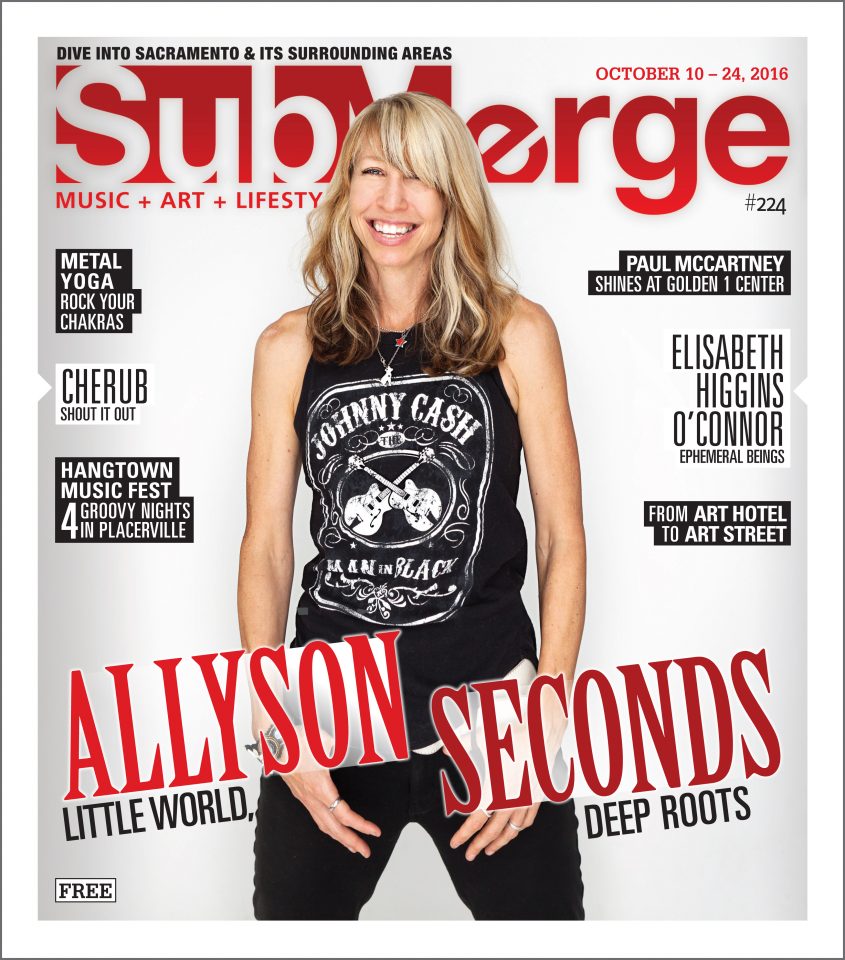
Allyson Seconds will be marking the release of Little World with a CD release show featuring special guests Anton Barbeau and Kevin Seconds, Oct. 22, 2016 at Shine, located at 1400 E St. in Sacramento. The all-ages show starts at 8 p.m with a $7 cover charge and one-drink minimum.
Cake’s Showroom of Compassion feels for you
Words by Adam Saake | Photo by Robert Knight
Longevity in the music industry has long been an admirable quality when we discuss a band and their merits. Not every musician can be Bob Dylan and few bands can be The Rolling Stones, who just won’t seem to go away. Flashes in the pan are the vast majority and that’s if you’re lucky. At least you have some good stories of what it was like, and maybe, if you had a catchy single, an immortal slot on the alternative radio rotation. The rock star talent that Sacramento has produced (yes, I’m listing them again)–Deftones, Tesla, Jackie Greene and even Far who managed a comeback–have all had pretty steady careers throughout the years. They all continue to put out records, tour on a regular basis and find support in a market that perpetually seems on the verge of collapse. Nobody buys music anymore, right? Cake’s John McCrea has his fingers crossed that that’s not the case.
“Hopefully there’s a few people left that think it’s OK to buy an album at this point,” quips McCrea.
With the upcoming release of their sixth studio album, Showroom of Compassion, slated to hit stores in mid-January, Cake has found a place that the band can find comfort in. Not because after 20 years of being a band they’re set for life, but because they’ve continued to push forward and do what’s right for them; major label support or not.
“Because of the instability of the music business, we had to reinvent what we wanted to do,” says McCrea. “We were able to extricate ourselves from the record label and start our own label.”
Part of this new venture was taking their time recording and engineering the new record, which they did entirely themselves in their Midtown studio.
“We took an old house and hollowed it out and put in microphones and solar panels on the roof,” says McCrea.
Showroom of Compassion, which was a “100-percent solar-powered recording process,” is Cake sounding as good as they ever have. They’ve always been a no-bullshit kind of band that hardly entertains with bells and whistles. Well, unless it’s actual bells and whistles or rattles or keyboards or whatever else the band deems lo-fi enough to make the cut. Songs on the new record are typical of their sound: minimal yet sonically engrossing with lyrics that leave you pondering their meaning. The grit is there, as always, but knowing how much time and personal attention went in to the songs makes the album seem so much more special.
McCrea joined Submerge via telephone from his home in Oakland, where he lives while the band isn’t recording in Sacramento.
Your press release says that you and the band had much more to do with the recording and engineering of the new record. What was the best thing that came out of that experience, besides a great new record?
I think it took forever doing it that way. We’ve always produced our own albums ourselves, which takes a long time. But also, we’ve increasingly been turning the knobs ourselves. I think we might be getting better at producing, which is hopefully the case. The best thing to come out of it is a sense of ownership and a sense of responsibility for what we’ve done. We don’t feel like anyone’s handed us anything. We never have. Even when we went to studios we were very hands-on. I guess early on we didn’t find people who really understood what we wanted to do, because what we wanted to do was very antithetical to what was going on at the time in the mid-‘90s when there was a lot of grunge. The production values were
very bombastic.
It seems like not a lot of people would want to take a chance with that because if they felt it wasn’t going to be successful then they wouldn’t touch it.
Certainly that was the case with record companies but also with producers. We didn’t know of a producer that was doing anything similar to what we wanted to do. In other words, no one was crazy enough to make stuff sound dinky. You know, during a period when everything was sounding very grandiose. We really thought that in a country like the United States, how rebellious is it to sound “big?” How subversive is creating the aural equivalent of deforestation? In a lot of ways it seemed like business as usual. So we thought, in the United States, to turn the volume down would probably be more scary and more subversive than turning it up. Not to say that all music that’s loud is bad; it’s just that we were tired of it at that point. It seemed like people were getting louder and louder. We freaked people out by turning the volume down. People used to yell at us to turn it up.
I see that you, Vincent [DiFiore] and Xan [McCurdy] all played keyboard or synthesizer on Showroom of Compassion. Was it very intentional to incorporate more of that sound into the songs?
Um…well I did allow something on this album that I hadn’t allowed ever before, which was acoustic piano. I always avoided it, because I thought it sounded too classy for us. There’s something really classy about acoustic piano, and I thought that’s not what we’re really about. But with this album, I found this old junker up in Portland [Ore.] and shipped it down here. I think it sounds crappy enough to be on our album, and it doesn’t sound like the good life or anything. As far as the other keyboards, the Nord and other stuff, we used quite a bit of keyboard on Pressure Chief–actually more, maybe, than this album. But certainly we used more keyboard on this album than we did on, say, our first album or our second album.
Over the past two-and-a-half years of writing the record, really taking your time, have you discovered that you like a slower pace of writing?
It wasn’t the writing that took a long time, it was the recording process that took a long time. We reconfigured our studio and put solar panels on the roof. We also did the same thing with reinventing our business from the ground up. We had to set up channels of distribution. We had to ask ourselves, what’s going to work now? Certainly we realized that the major-label music business structure wasn’t right for us. For one thing, it’s too expensive. If a really good percentage of people have decided that recorded music should be free, it’s no longer sustainable to have a bunch of record company suits eating out every night on our dime. We wanted to get ourselves away from that. I think we had to re-evaluate and take some time off to think and decide how we wanted to do it and whether there were still enough people to support us. The sales for recorded music have declined precipitously in the last 10 years. We wanted to economize and make sure that we could still pay our bills. By having our own record label, it helped quite a bit. Five or 10 years from now, who knows? There might be a whole different system. It would be nice if there was a different system–a way for musicians to have health insurance.
You’re an outspoken guy when it comes to issues that are important to you, yet your lyrics don’t seem too over the top. Is there a method to your madness when you sit down to write lyrics?
I don’t really sit down to write lyrics. I’m sort of writing lyrics all the time. I’ve had this notebook in my back pocket since I was a kid. I just sort of take notes about things that I find interesting or disturbing or upsetting. Then eventually I sit down and put all these little pieces of paper into songs and that’s my process. I wouldn’t say there’s that much singular intentionality to it. I think it’s a lot of different agendas I have. I do try not to be overly obvious with the songwriting. I describe the way things feel or smell or look rather than telling people exactly what I think. I think also there’s something to be said for a song being somewhat multi-purpose. For instance the song “Sick of You” I think can be looked at more specifically to be about a relationship between two people and it can also, I think, in a broader way be about general societal mood nowadays.
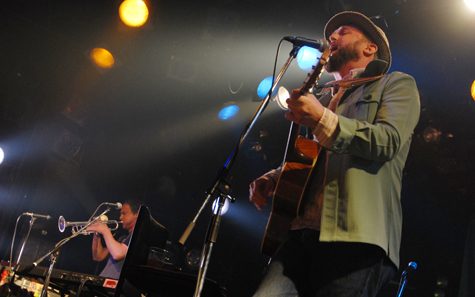
Photo by Teppei
You guys have been known to play secret shows here and there. I know there’s been a few at the Blue Lamp, Old Ironsides and I remember some at the old Capitol Garage too. Is that something that you do for the Sacramento fans? Is it to warm up a new live set before you hit bigger venues? Both?
Yeah, it serves both purposes. It’s hard to figure out what you want to do live without actually playing live. It’s also a thank you to Sacramento for supporting us all these years. And it’s also for our listeners who have signed our mailing list, because without a record company we really depend on the direct connection to our listeners. If it’s the only way for people to find out about those shows by signing the mailing list, then I think it’s a good incentive. It’s a good way for us to stay in touch with people and a good reason for people to want us to stay in touch with them.
When did the whole idea of giving away trees at your shows, the Cake Forest, begin and what prompted that?
I planted a tree in Sacramento in front of one of my apartments where I lived a long time ago. I put it in the median between the sidewalk and the street. It was about as tall as my chest, I imagine. Things happened in my life, I moved away and the band started doing well, and I started being away from home all the time. I forgot about the tree.
Years passed and I went back to it and, oh my god, it was way up there. It’s a profound physical reiteration of the passage of time. That’s really what trees are all about. And I just thought; wow this was a great experience that I had. Being able to plant a tree and come back years later to see what was going on with it. I thought, everybody should have that experience. Everybody should try to plant at least one tree in their whole life. As the tree gets bigger and stronger, you get older and die. I thought, wow we could make a deal with people that if we give them the tree they have to send photographs of themselves standing next to the trees and keep us posted on how the tree’s doing. Even if it dies, people are supposed to send us a photograph and we put it up on our site.
Have you gotten a lot flack for using Cake’s website as a place to educate and discuss the global and local issues that are important to you and the band?
Oh yeah. It’s almost not even worth it to say anything on our website anymore. People just freak out! I feel like some people must be paid operatives from the Heritage Foundation or something. Just freaking out. I think they want to shut us down. I don’t find websites of bands very interesting. I think it’s kind of unhealthy just to focus only on the people and the band. I think it’s better to talk about subjects. Our music is about subjects, and I feel like we shouldn’t be barred from discussing subjects on our website.
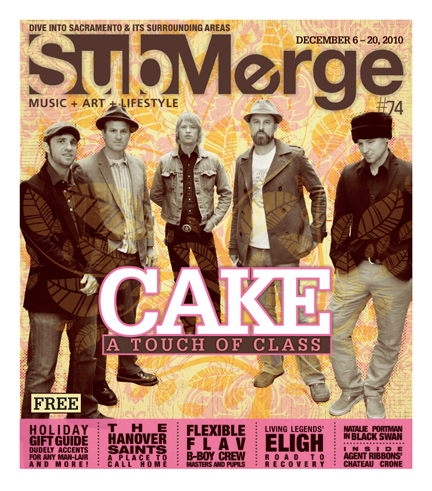
Cake’s Showroom of Compassion will be in stores Jan. 11, 2011. If you do still buy albums, this will be a good one for you to get. If you’d like to sign up for Cake’s e-mail newsletter, go to www.cakemusic.com/news and click the link on the top left of the page.
Sacramento’s Far Comes Home
By Mark Lore | Photos by Jeff Gros
They say you always want to go out on top. If that’s the case, then Sacramento’s Far did everything right. In the mid-’90s Sacramento was on the radar as bands like Cake and Deftones were signing to majors (remember those days?), while post-hardcore was bubbling underneath the city’s surface.
Far soon followed. After a pair of indie releases (1992’s Listening Game and Quick in ’94), the band signed with Epic/Immortal and released Tin Cans With Strings to You in 1996, in the process amassing a dedicated following. Hell, you know the story. Far released its best record in 1998—Water & Solutions—an album that harnessed punk, post-hardcore and even pop (?!) into 41 flawless minutes”¦then called it quits.
“I’m happy we stopped after Water”¦,” says vocalist/guitarist Jonah Matranga. “It was a good balance of all of our personalities.”
Those personalities have fueled various projects over the years—Matranga with his own project, Onelinedrawing, and bands like New End Original and Gratitude. Guitarist Shaun Lopez fronted The Revolution Smile. Drummer Chris Robyn and bassist John Gutenberger went on to form the more pop-oriented Milwaukee, while Gutenberger later formed Two Sheds with his wife, Caitlin.
But it always comes back to Water & Solutions—an album that a decade’s-worth of bands would nefariously hold close to their pained little hearts. In fact, Far might be one of the few bands that actually gained popularity after it broke up.
While it was surprising to hear that in November Far, after a decade apart, was planning on playing a few shows in the U.K., it’s been no surprise that the band’s recent reformation has been met with such unadulterated glee. But the members of Far have kept it loose and stress-free—they re-emerged under the moniker Hot Little Pony, recorded a cover of Ginuwine’s 1996 hit “Pony” (yes, Ginuwine), and are now gearing up for their homecoming show at the Empire on Jan. 15.
Submerge caught up with Matranga and Lopez, who filled us in on the not-so-elaborate Hot Little Pony marketing scheme, what the future holds, and why they don’t want to be blamed for Fall Out Boy.
The music climate has changed quite a bit in the last 10 years. Is that a good thing or a bad thing?
Shaun Lopez: It’s good for us, because we’re in a unique position in being able to go out on tour and be self-sufficient, and be able to make a little money on top of that. I feel for new bands starting up right now because it is tough out there. Record deals being offered to young new bands are not so great; they’re almost better off doing it on their own. For us it’s been OK. Luckily we’re in a position that we do have fans that are pretty dedicated—it’s something we’re very thankful for and very surprised.
Whose idea was it to start playing together again?
SL: It came close when we did the re-release of Water & Solutions [in 2004]. It never came to, and I think in all honesty it probably wasn’t the right time and it wasn’t for the right reasons. Chris [Robyn] and I had been talking about it off and on and then Jonah called me about a year ago and brought the idea of just showing up at a club and playing. I liked the idea of playing again, but I wanted to do it more professionally and go out on a tour.
Jonah Matranga: He always tries to be more professional than me; I’m always the guy that wants to go out and just bang it out. And he’s like, “No dude, gotta rehearse; make it good.” So we balance each other out that way.
There was this semi-elaborate scheme with the Hot Little Pony concept. Whose idea was that? And who decided to record a Ginuwine song?
JM: What looks complex from the outside is just us fucking around on the inside. We wanted to play a couple of shows, and I just really wanted to take the hype away from it because a) I don’t like it, and b) I wanted us to be as unstressed as possible. I think our friend Jeff jokingly thought of the name Hot Little Pony. And we just all laughed when he said it and thought, “Ah that would be really fucking funny.” “Pony” is a tune that we’d always play before shows back in the day. And it’s just a simple song, and so Shaun and Chris laid it down [in Los Angeles] and I came down and sang it. Shaun added his magic dust to it. I don’t know, it just came out; it was a fun, very quick thing.
Now you have your homecoming show in Sacramento. Is that going to be a gauge of whether this continues?
JM: I think it’s all a gauge. There’s nothing official on the books, but there’s a lot being talked about. I think we’re all just trying to take it as it comes. The first two Hot Little Pony shows were like, “OK, can we do this well?” Because it was really important to all of us to not go up there and suck. And then we did the L.A. shows and thought we pretty much ripped it. Then we thought, “OK, can we tour together? Can we not drive each other insane?” The whole “Pony” thing has definitely thrown it into a different gear. We’ve never had any sort of radio play like this so we’ll sort of look at that and see what that means, if anything.
Any shows beyond Sacramento?
JM: Just Sacto. We’re very excited about that. It’s a big enough show where I think it will be fun and exciting, but it still feels like home. We got some friends’ bands on there. I feel pretty sure that more shows will happen, but we have nothing on the books. And then we’re looking at trying to do a little recording together, see what happens with that. My particular take is just trying to do a couple of covers that suggest where we came from as a band. I’m very reticent to do original songs. I don’t want to do an original song just to have a new song, and have it not be as good as the old shit. Because all of our favorite old bands do that and it blows.
Water & Solutions has been touted as your masterpiece. Does that put more pressure on you to record?
SL: I realize that no matter what we do, people are always going to love that record. That’s going to be the record.
JM: Yeah, but some people, frankly, like Tin Cans“¦ more, which I don’t understand. That’s the thing with putting out records”¦I don’t get to control what other people think. But for me, there’s no pressure with people, there’s just pressure for me… I just want to know it kicks ass. We could put something out as good as Nevermind, and people will still be like, “Yeah, you know, I kinda like ‘Bury White.'” But I would just want to feel in myself that it came from an inspired place, and that I could go out with confidence and play it live and feel as strong as I do playing “Bury White” or “Mother Mary” or “Man Overboard.” Those songs, I just feel good playing them. And I don’t feel good playing them because I’m used to them; I feel good because they’re good, and they’re good 10 years later.
Far has influenced a style of music that is looked down on, although you sound nothing like those bands. Do you guys think about that?
JM: I’ve been asked that question a gazillion times in interviews, and my stock answer that sort of makes me laugh, that I totally believe is: I don’t blame Led Zeppelin for Whitesnake and I don’t want to be blamed for Fall Out Boy. We just came around trying to play rock ‘n’ roll that was less dressed up and more human, and mixing heavy shit and more anthemic shit we liked from big rock with this sort of humble, straight in-your-face element of punk. A lot of bands at the time were doing that. And as it happened, when that sort of caught on, there were a lot of bands that traded in their leopard jeans and whatever else the fuck for horn rims and tight pants. They took all the cheap parts and tried to make money off of it, and forgot the important part, which was the humanness of it.
You’ve all changed as people in the last 10 years. How is Far different today than it was in ’98?
JM: The funny thing is that we’ve all changed as people, but the personality balance still to me is working out relatively similarly. I think Shaun and I are better at recognizing that we’re different people, and talking it through, which rules.
SL: Yeah, the communication is much better. In the past a lot of the problem was that when shit would piss people off, they wouldn’t say anything.
JM: It feels good now to come in with a little more time to breathe. And I do think we’ve all, through our individual experiences, learned a little about how important it is to clear the air before shit gets crazy.
Being in a band is like being in a relationship “¦
JM: I liken it to a relationship where the sex is really good, but everything else is weird [laughs]. To me that’s the closest analogy I could come up with without sounding creepy.

Singer Christopher Fairman Shows that Darkness Can Be Beautiful
Listen to local musician Christopher Fairman’s upcoming new release, 85, 87, and allow Fairman’s smooth, strong vocals to meld with guitarist Nick York’s haunting, melodic riffs. Fairman’s brooding voice is just slightly reminiscent of singers like Ryan Adams and Nick Drake, with a darkness that permeates throughout all seven tracks—powerful, lilting melodies with the occasional romantic ballad thrown in (hey, he is only 23).
Let’s not forget that the CD was recorded in just four hours, in a session that was equally surprising to Fairman, York and producer David Houston. Although Fairman had been mulling the tracks over in his mind for months, he had no idea when the day would come to record. But the muse is a fickle creature, and one day, it struck.
“I had a really bad day, and for some reason I just knew it was the day to record,” he says. There’s nothing like recording an entire album practically straight through to turn your day around. “It was a good day. But afterward, I was pretty mentally drained,” he remembers.
Songwriting seems to be Fairman’s forte. He says that although he’s dabbled in music since the age of 8—including piano, violin and saxophone—none of those instruments really spoke to him.
“I didn’t feel like I could express myself enough,” he explains. “I decided to play the bass, which just made me want to play the guitar, which is where I ended up. I really probably only played the guitar to write songs.”
The new album marks a personal triumph in regards to Fairman’s writing, as he explains, “I think it’s the first time that I feel really good about being a writer” I was able to really let go and I could write about things I would be afraid to write about before.” You’ll hear poetry in the music, with the melodies carrying you to a place where you forget you’re even listening to words. “I write every song differently. I’m a big fan of poetry, but I don’t consider myself a poet.”
The cover art on 85, 87 was painted by Michael Pitcher, one of Fairman’s best friends, and serves more than just decoration. Fairman points to the painting as being one of the main inspirations behind the entire album.
“The painting was a big part of a year of my life, because I was writing songs and he was painting his painting, and then he gave it to me for my birthday, Fairman says. “It really feels like a year of my life all really came together.”
Song choices on the album were largely a result of that connection to Pitcher’s painting. Fairman relates that he had 18 songs to choose from, but made the decision to whittle them down to the seven songs that were the darkest. “I kind of purposely wanted to go darker because the painting is pretty dark,” he says.
Although Fairman is still young, he seems keenly aware of both his own emotions and the emotions of others. And although his music may be dark, it isn’t entirely autobiographical. “I feel like I took a year of my life and condensed it, like someone writing a novel might do. Not every character is about them,” he explains.
Fairman has also built a lengthy resume in a relatively short time. His first taste of music production happened with the band he formed while in high school, Fairman and Friends, which included pianist David DeMuri and drummer Jon McHenry. They released their CD, Patiently Waiting, in 2004. In 2006, Fairman put out a solo EP. Then, later that year, he released his full-length album Born Broken, a slightly jazzier and more pop-like album than his newest release, and including a variety of different musicians and instruments—listen for cello and violin in the background of certain tracks.
Beyond simple evolution, Fairman’s musical abilities have matured while working with so many different musicians, allowing him to embrace his many sides. “I think that back in my first band I wanted to do this jazzy rock kind of thing, and now I have separate things. I have this solo thing that is kind of dark, really moody, airy stuff. I also have a band called The Stilts and that is a mix of a pop, rock and psychedelic band.”
He calls The Stilts his “rock band”; when Fairman’s going to play at Old Ironsides, he is accompanied by Nick York and Mike Farrell on guitar, Matt McCord on drums and Chris Vogel on bass. If he’s going to Luna’s Café, that’s when he goes solo, with Nick York’s guitar riffs to carry him through.
Although Fairman still waits tables now, it’s safe to guess that he won’t need a day job for much longer. “I see music as a business,” he says, explaining all the work he’s put into his musical career thus far. “There’s just so many things you have to do to actually put on the show, especially because I like things to be good.” In the meantime, we should definitely plan on hearing the name Christopher Fairman in the Sacramento area for quite a while. “John McRea, the guy in Cake, told me that the way to make it is to keep going until you can’t do it anymore,” Fairman says.
